The Haitian History Thread - Culture - Nairaland
Nairaland Forum / Nairaland / General / Culture / The Haitian History Thread (16420 Views)
Ibo Granmoun : The Roots Of Haitian Democracy / Yoruba History Thread / I'mma Haitian That Wants To Change My Name. (2) (3) (4)
| The Haitian History Thread by Nobody: 5:30pm On Jun 05, 2013 |
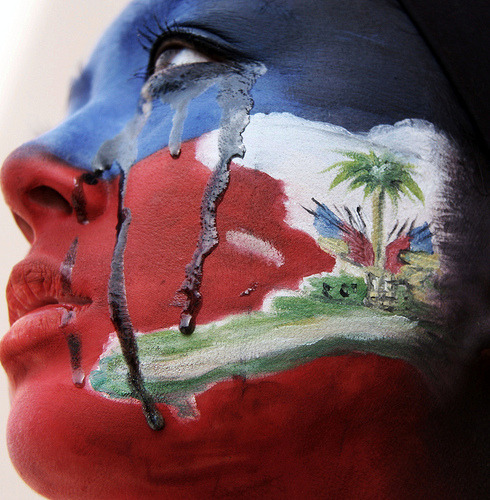 Watsup Nairaland...Ehh...I made this thread because I was bored and because it would be fun and interesting. This thread is everything Haitian, from history, art, architecture, culture,people,etc. Me being part Haitian descent wanted to make this thread. So this thread is everything Haitian. Anyone can contribute. So...Yeah whatever. Enjoy. [size=15pt]Haitian Revolution [/size] [img]http://03varvara.files./2011/11/00-19th-century-russian-painting-of-the-haitian-revolt.jpg[/img] The Haitian Revolution has often been described as the largest and most successful slave rebellion in the Western Hemisphere. Slaves initiated the rebellion in 1791 and by 1803 they had succeeded in ending not just slavery but French control over the colony. The Haitian Revolution, however, was much more complex, consisting of several revolutions going on simultaneously. These revolutions were influenced by the French revolution of 1789, which would come to represent a new concept of human rights, universal citizenship, and participation in government. In the 18th century, Saint Dominigue, as Haiti was then known, became France's wealthiest overseas colony, largely because of its production of sugar, coffee, indigo, and cotton generated by an enslaved labor force. When the French revolution broke out in 1789 there were five distinct sets of interest groups in the colony. There were white planters -- who owned the plantations and the slaves -- and petit blancs, who were artisans, shop keepers and teachers. Some of them also owned a few slaves. Together they numbered 40,000 of the colony’s residents. Many of the whites on Saint Dominigue began to support an independence movement that began when France imposed steep tariffs on the items imported into the colony. The planters were extremely disenchanted with France because they were forbidden to trade with any other nation. Furthermore, the white population of Saint-Dominique did not have any representation in France. Despite their calls for independence, both the planters and petit blancs remained committed to the institution of slavery. The three remaining groups were of African descent, those who were free, those who were slaves, and those who had run away. There were about 30,000 free black people in 1789. Half of them were mulatto and often they were wealthier than the petit blancs. The slave population was close to 500,000. The runaway slaves were called maroons; they had retreated deep into the mountains of Saint Dominigue and lived off subsistence farming. Haiti had a history of slave rebellions; the slaves were never willing to submit to their status and with their strength in numbers (10 to 1) colonial officials and planters did all that was possible to control them. Despite the harshness and cruelty of Saint Dominigue slavery, there were slave rebellions before 1791. One plot involved the poisoning of masters. Inspired by events in France, a number of Haitian-born revolutionary movements emerged simultaneously. They used as their inspiration the French Revolution’s “Declaration of the Rights of Man.” The General Assembly in Paris responded by enacting legislation which gave the various colonies some autonomy at the local level. The legislation, which called for “all local proprietors...to be active citizens,” was both ambiguous and radical. It was interpreted in Saint Dominigue as applying only to the planter class and thus excluded petit blancs from government. Yet it allowed free citizens of color who were substantial property owners to participate. This legislation, promulgated in Paris to keep Saint Dominigue in the colonial empire, instead generated a three-sided civil war between the planters, free blacks and the petit blancs. However, all three groups would be challenged by the enslaved black majority which was also influenced and inspired by events in France. Led by former slave Toussaint l’Overture, the enslaved would act first, rebelling against the planters on August 21, 1791. By 1792 they controlled a third of the island. Despite reinforcements from France, the area of the colony held by the rebels grew as did the violence on both sides. Before the fighting ended 100,000 of the 500,000 blacks and 24,000 of the 40,000 whites were killed. Nonetheless the former slaves managed to stave off both the French forces and the British who arrived in 1793 to conquer the colony, and who withdrew in 1798 after a series of defeats by l’Overture’s forces. By 1801 l’Overture expanded the revolution beyond Haiti, conquering the neighboring Spanish colony of Santo Domingo (present-day Dominican Republic). He abolished slavery in the Spanish-speaking colony and declared himself Governor-General for life over the entire island of Hispaniola. At that moment the Haitian Revolution had outlasted the French Revolution which had been its inspiration. Napoleon Bonaparte, now the ruler of France, dispatched General Charles Leclerc, his brother-in-law, and 43,000 French troops to capture L’Overture and restore both French rule and slavery. L’Overture was taken and sent to France where he died in prison in 1803. Jean-Jacques Dessalines, one of l’Overture’s generals and himself a former slave, led the revolutionaries at the Battle of Vertieres on November 18, 1803 where the French forces were defeated. On January 1, 1804, Dessalines declared the nation independent and renamed it Haiti. France became the first nation to recognize its independence. Haiti thus emerged as the first black republic in the world, and the second nation in the western hemisphere (after the United States) to win its independence from a European power. Source: http://www.blackpast.org/?q=gah/haitian-revolution-1791-1804 2 Likes |
| Re: The Haitian History Thread by Nobody: 5:33pm On Jun 05, 2013 |
[size=16pt]Toussaint Louverture[/size]  "By early 1794 Toussaint Louverture was able to organize 4,000[citation needed] blacks into a band of loyal guerrilla troops, as he was a gifted, although untrained, leader and military strategist. It was not until February 1794 that the French Convention formally abolished slavery. Toussaint negotiated with General Laveaux and changed sides in May 1794. He then fought against the Spanish Empire, recovering all the forts of the Cordon de L'Ouest in less than two weeks and delivering the North to the French Republic. He also fought against the British Empire" "By June 1795, the British had been driven back to the coast. In July the Spanish officially withdrew. Although the British continued to fight from coastal towns, Toussaint maintained his control over the North and West of Saint-Domingue. In May 1797 Sonthonax named Toussaint Louverture commander-in-chief of the French republican army in Saint-Domingue." "He was also successful in leading his relatively small band of troops (in lightning quick strikes) to gain strategic defeats and the withdrawal of an army of 10,000 British soldiers. In 1798, the British made a last-ditch attempt to oust Louverture by attacking from the South, sending General Thomas Maitland. Maitland failed and signed a secret treaty in which Toussaint Louverture agreed to leave the ports open to commercial shipping of all nations. The British withdrew from the colony." Source: http://en.wikipedia.org/wiki/Toussaint_L%27Ouverture http://www.pbs.org/wgbh/aia/part3/3p2990.html |
| Re: The Haitian History Thread by Nobody: 5:36pm On Jun 05, 2013 |
[size=15pt]Henry Christophe(Haitian)[/size]  In 1767, Henri Christophe was born on the island of Grenada, a British colonial acquisition. His parents were slaves brought to Grenada with thousands of other west Africans to work in the sugar industry. The Africans that the English used as slaves in the sugar industry were known for their fierce and determined nature to resist the institution of slavery. The revolutionary nature of Henri Christophe has its roots deeply embedded in his African ancestry. Henri's obstinate, argumentative, and obdurate nature led his father to sell his services to a French ship's Captain as a cabin boy, before had reached the age of ten. The ship's captain sold Henri to a French sugar planter in the French province on the island of Saint Dominique called Haiti, which was a Carib Indian name meaning "the land of the mountains." The brutality of the French planters led to much discontent among the slaves in Haiti. These acts of brutality were witnessed by Henri and set the stage for his role in the Haitian revolution. Christophe participated in the American Revolutionary War in the French contingent. Sergeant Henri Christophe was among the five hundred forty-five Haitian free Negroes known as the Fontages Legion. Fighting to make men in another country free from oppression created a thirst for freedom within Christophe. In June 1794, Haiti was threatened with the threat of the Spaniards and the English who wanted to share the wealth created by the sugar industry. The Spaniards constituted the greatest threat and a battle for control of Haiti ensued. The three principal figures in the Haitian revolution were Toussaint L'Overture, Jean Jacques Dessalines, and Henri Christophe. Toussaint joined the French forces against the Spaniards and became a general of the slaves and marched to several villages, liberating his brothers who immediately joined his forces. After having distinguished himself in battle, Christophe was made a sergeant by Toussaint and later made a General by Dessalines. The French forces were defeated and Haiti was declared an independent republic on November 27, 1803. The republic of Haiti was divided into two states and Christophe was elected president of the Northern State in February of 1807, and Alexandre Petion was elected President of the Southern Repbulic of Haiti in March. The division between the republics was to last for a decade. Source: http://www.polymernotes.org/biographies/HTI_bio_christophe.htm |
| Re: The Haitian History Thread by Nobody: 5:39pm On Jun 05, 2013 |
Nice! Please post more. 1 Like |
| Re: The Haitian History Thread by Nobody: 5:40pm On Jun 05, 2013 |
[size=15pt]Jean Jacques Dessalines [/size] 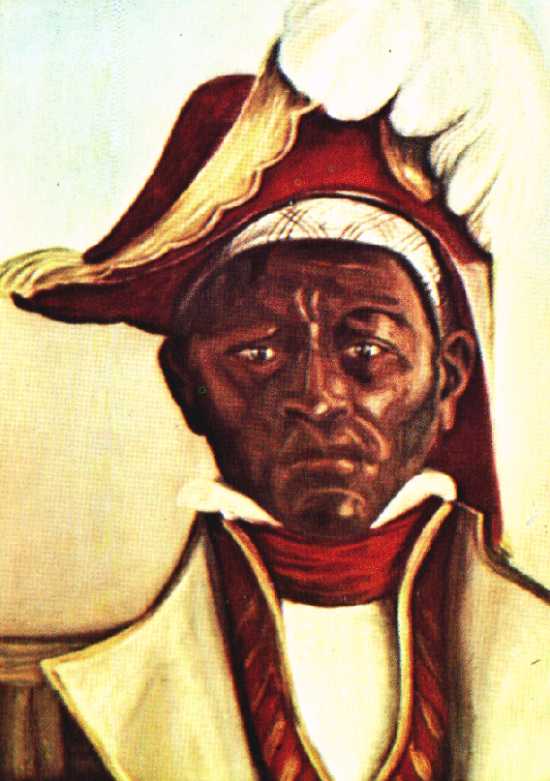 [size=13pt]Defeat of the French Army by the Haitian Rebels:[/size]     After the deportation of Toussaint Louverture in 1802, one of Toussaint's principal lieutenants, Jean Jacques Dessalines, continued the fight for liberty because he remembered the declaration of Toussaint Louverture: “In overthrowing me, you have done no more than cut down the trunk of the tree of the black liberty in St-Domingue it will spring back from the roots, for they are numerous and deep.” Dessalines defeated the French army numerous times but the only place left was Vertières. During the night of 17–18 November 1803, the Haitians positioned their few guns to blast Fort Bréda, located on the habitation where Toussaint Louverture had worked as a coachman under François Capois. As the French trumpets sounded the alarm, Clervaux, a Haitian rebel, fired the first shot. Capoix, mounted on a great horse, led his demibrigade forward despite storms of bullets from the forts on his left. The approach to Charrier ran up a long ravine under the guns of Vertières. French fire killed a number of soldiers in the Haitian column, but the soldiers closed ranks and clambered past their dead, singing. Capoix’s horse was shot, faltered and fell, tossing Capoix off his saddle. Capoix picked himself up, drew his sword; brandished it over his head and ran onward shouting: "Forward! Forward!" Rochambeau was watching from the rampart of Vertières. As Capoix charged forth, the French drums rolled a sudden cease-fire. Suddenly, the battle stood still. A French staff officer mounted his horse and rode toward the intrepid Capoix-la-Mort (Capoix-the Death). With a great voice he shouted: "General Rochambeau sends compliments to the general who has just covered himself with such glory!" Then he saluted the Haitian warriors, returned to his position, and the fight resumed. General Dessalines sent his reserves under Gabart, the youngest of the general and Jean-Philippe Daut, Rochambeau’s guard of grenadiers formed for a final charge. But Gabart, Capoix, and Clervaux, the last fighting with a French musket in hand and one epaulette shot away, repulsed the desperate counterattack. A sudden downpour with thunder and lightning submerged the battlefield. Under cover of the storm, Rochambeau pulled back from Vertières, knowing he was defeated and that Saint-Domingue was lost to France. Another leader of the fight at Vértieres was Louis Michel Pierrot, the husband of the mambo Cécile Fatiman who had led the vodou ceremonies at Bois Caïman on 14 August 1791 together with Boukman. Results of the Battle By the next morning, the general Rochambeau sent Duveyrier, to negotiate with Dessalines. At the end of the day, the terms of submission were settled. Rochambeau got ten days to embark the remainder of his army and leave Saint-Domingue. The wounded French soldiers were left behind under key until well enough for return to France, but they were drowned a few days later.    This battle occurred less than two months before Dessalines' proclamation of the independent Republic of Haiti on 1 January 1804 and delivered the final blow to the French attempt to stop the Haitian Revolution and re-institute slavery, as had been the case in its other Caribbean possessions. The Battle of Vertières marked the first time in the history of mankind that a slave army led a successful revolution for their freedom. November 18 has been widely celebrated since then as a Day of Army and Victory in Haiti. This battle occurred less than two months before Dessalines' proclamation of the independent Republic of Haiti on 1 January 1804 and delivered the final blow to the French attempt to stop the Haitian Revolution and re-institute slavery, as had been the case in its other Caribbean possessions. The Battle of Vertières marked the first time in the history of mankind that a slave army led a successful revolution for their freedom. November 18 has been widely celebrated since then as a Day of Army and Victory in Haiti.Source: http://en.wikipedia.org/wiki/Battle_of_Verti%C3%A8res [size=13pt]Jean Jacques Dessalines defeated the French AGAIN at The Battle of Crete a Pierrot:[/size] The Battle of Crête-à-Pierrot was a major battle of the Haitian Revolution. The battle took place at the fort of Crête-à-Pierrot (in Haitian Creole Lakrèt-a-Pyewo), east of Saint-Marc in the Artibonite River valley. General Charles Leclerc's French colonial army besieged the heavily barricaded fort, which was defended by Haitian forces under Jean-Jacques Dessalines. The fort was significant as it controlled access into the Cahos Mountains. The defenders, running short of food and munitions, eventually abandoned the fort but were able to force their way through the French lines and into the Cahos Mountains. The French, although gaining control of the fort, had suffered heavy losses, including the death of General Charles Dugua. This was the deciding battle that forced the French to withdraw from the war. The fort was never captured Source: http://en.wikipedia.org/wiki/Battle_of_Cr%C3%AAte-%C3%A0-Pierrot |
| Re: The Haitian History Thread by Nobody: 5:41pm On Jun 05, 2013 |
Nice! Please post some more |
| Re: The Haitian History Thread by Nobody: 5:41pm On Jun 05, 2013 |
ifeness: Nice! Please post more. Thank you.  I'm glad you are liking this thread. I will definitely be posting more. Right now I'm just finishing up the Haitian revolution first. |
| Re: The Haitian History Thread by Nobody: 5:43pm On Jun 05, 2013 |
François Capois  [size=13pt]Capturing of Port-de-Paix and Tortuga Island (L'ile de la Tortue)[/size] After receiving new troops from France, Rochambeau dispatched General Clauzel against Port-de-Paix which Capois was forced to evacuate, but the fearless black general redeemed his defeat by storming the Petit-Fort where he captured the ammunition, of which he was in great need. After his success at Petit-Fort, he decided to attack Tortuga island. The most difficult problem he had in this attack was how to reach this island without ships. He made up for this lack by building a raft consisting merely of planks held together by lianas. On the night of February 18, 1803, 150 soldiers under the command of Vincent Louis were huddled together on this frail means of transportation in tow of 2 rowboats. They fell unexpectedly on the garrison of Tortuga and for a while seemed to be the conquerors. But the French, who soon got over their surprise, rallied and defeated Vincent Louis, who succeeded in making his escape with some of his companions. The unfortunate blacks who were taken prisoner by the French were tortured to death in expiation of the audacious attempt. The failure did not discourage the energy of Capois. On April 12, 1803, Capois stormed Port-de-Paix, and soon after, Vincent Louis on his raft was again on his way to Tortuga. He succeeded this time in taking possession of the island, which the French never recovered. [size=13pt]Battle of Vertières[/size] On November 18, 1803, Jean-Jacques Dessalines had ordered Capois to take Vertières, a fort situated upon the mount. Capois-la-Mort advanced with a demi-brigade which, horribly multilated, soon recoiled before the cannon fire coming from the fort. He led it back for a second time, but was again driven to the bottom of the hill by the mitrailleuse. Boiling with rage, Capois ran to seek other new troops and, mounting his horse, advanced for the third time; again the thousand deaths that vomited from the fortress repulsed him and his brigade. Now for the fourth time, he asked his men to follow him by saying "Forward! forward!." While he was at the head of his men, his horse was hit by a cannonball—he fell, but Capois took his sword, got up, and ran to place himself again at the head of his black soldiers by shouting "Forward! Forward!" His cap, garnished with plumes, was carried away by a shot. He replied to the insult which left him hatless by drawing his sword and again throwing himself into the assault. Observing this, Rochambeau and his men shouted: "Bravo! bravo! bravo!" The firing in the fort ceased. Suddenly, the battle was still. A French staff officer mounted his horse and rode toward the intrepid Capois-la-Mort. With a great voice he shouted: "General Rochambeau sends compliments to the general who has just covered himself with such glory!" Then he saluted the Haitian warriors, returned to his position and the fight resumed.    The next morning a French officer followed by his companions led to the headquarters of the Haitian army a horse caparisoned, and delivered him with these words: "The Captain-general (Rochambeau) offers this horse as a mark of admiration to the "black Achilles" to replace the one of his that the French army regrets having killed." The next morning a French officer followed by his companions led to the headquarters of the Haitian army a horse caparisoned, and delivered him with these words: "The Captain-general (Rochambeau) offers this horse as a mark of admiration to the "black Achilles" to replace the one of his that the French army regrets having killed."Source: http://en.wikipedia.org/wiki/Fran%C3%A7ois_Capois |
| Re: The Haitian History Thread by Nobody: 5:52pm On Jun 05, 2013 |
[size=15pt]Citadelle Laferrière or also known as Citadelle Henry Christoph[/size] Built by Henri Christophe, who was one of the leaders during the Haitian slave rebellion, after Haiti gained independence from France at the beginning of the 19th century. Built just in case the French ever invaded again.     |
| Re: The Haitian History Thread by Nobody: 6:01pm On Jun 05, 2013 |
[size=15pt]Sans-Souci Palace[/size] The royal residence of King Henri I (better known as Henri Christophe). Constructed in 1810 and was completed in 1813...      |
| Re: The Haitian History Thread by Nobody: 6:08pm On Jun 05, 2013 |
  ^^^Haitian monument in Savannah Georgia. Monument dedicated to Haitian soldiers in American Revolution Written by RUSS BYNUM SAVANNAH, Georgia (AP) - Haitians learn it in school, but it is virtually unknown in the United States: In the American Revolutionary War's bloody siege of Savannah, hundreds of Haitian soldiers were there for the colonies. That contribution to American independence has been honored with a monument dedicated Oct. 8 in Savannah's Franklin Square. Life-size bronze statues of four soldiers now stand atop a granite pillar 6 feet tall and 16 feet in diameter. "This is a testimony to tell people we Haitians didn't come from the boat,'' said Daniel Fils-Aime, chairman of the Miami-based Haitian American Historical Society, one of many Haitian Americans who came to Savannah for the dedication. "We were here in 1779 to help America win independence. That recognition is overdue.'' In October 1779, a force of more than 500 Haitian free blacks joined American colonists and French troops in an unsuccessful push to drive the British from Savannah in coastal Georgia. More than 300 allied soldiers were gunned down charging British fortifications Oct. 9, making the siege the second-most lopsided British victory of the war after Bunker Hill. Haiti's role in the American Revolution is a point of national pride. After returning home from the war, Haitian veterans led their own rebellion that won Haiti's independence from France in 1804. "It's a huge deal,'' said Philippe Armand, vice president of the Association of American Chambers of Commerce in Latin America, who flew to Savannah from the Haitian capital of Port-au-Prince. "All the Haitians who have gone to school know about it from the history books.'' Fils-Aime's group has spent the past seven years lobbying Savannah leaders to support the monument, which the city approved in 2005, and raising more than $400,000 in private donations to pay for it. Fils-Aime said the historical society still needs $250,000 to finish two additional soldier statues. As it stands now, the monument features statues of two Haitian troops with rifles raised on either side of a fellow soldier who has fallen with a bullet wound to his chest. The fourth statue, a drummer boy, depicts a young Henri Christophe, who served in Savannah as an adolescent and went on to become Haiti's first president - and ultimately king - after it won independence. It is unclear exactly what role Haitian troops played in the battle at Savannah because Haitian records from that era were destroyed by fire in the 1830s, said Scott Smith, director of Savannah's Coastal Heritage Society, which is dedicating a park on the battlefield site Tuesday. But surviving records show 545 Haitian soldiers sailed to Savannah in 1779 - making them the largest military unit of the Savannah battle. The Haitians are also believed to have been the largest black unit to serve in the American Revolution. |
| Re: The Haitian History Thread by Nobody: 6:20pm On Jun 05, 2013 |
Old Haitian photos. I actually believe Haiti was the first 'black' empire and not republic... Emblem of Haitian Empire 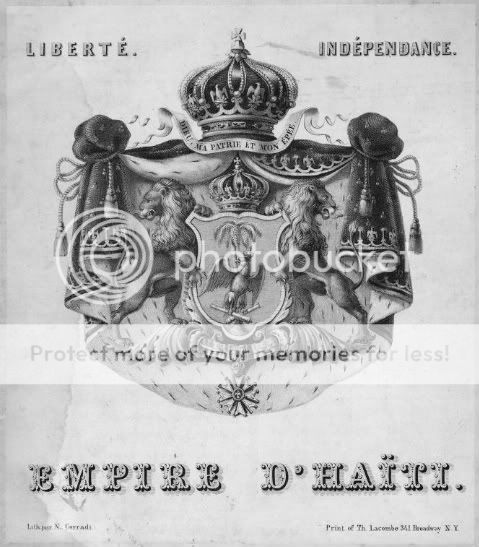 Emperor Soulouque 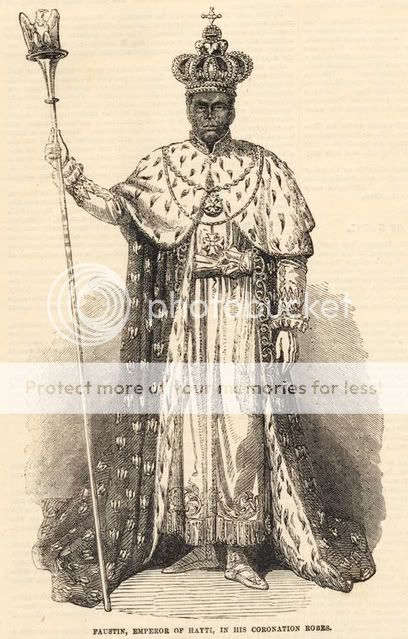 Empress Adelina 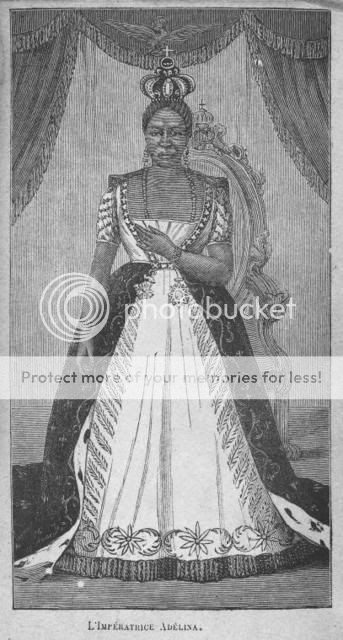 Princess Olivette 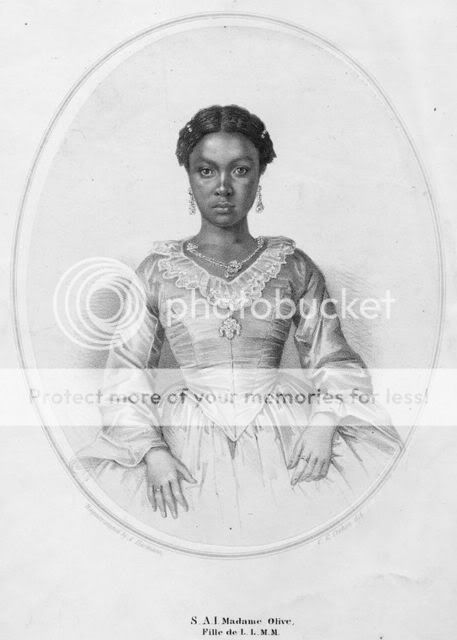 Jean Philippe Ville Lubin 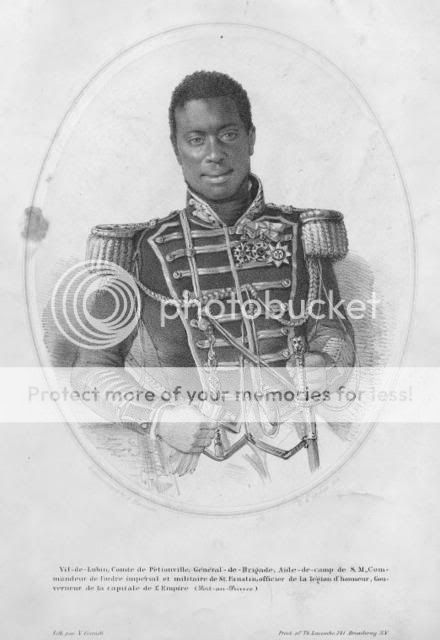 Jean-Pierre Damien de Delva 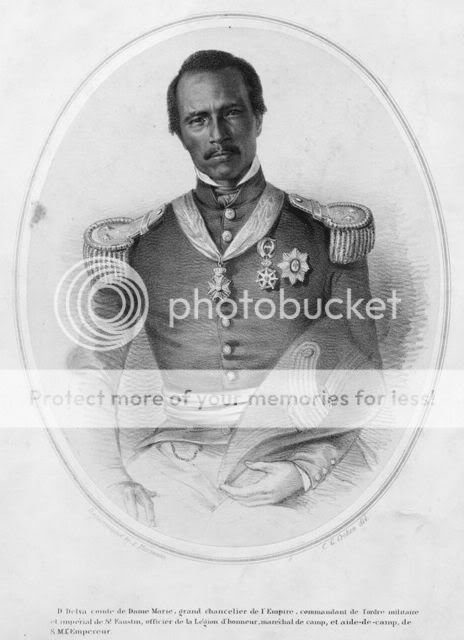 A young Salomon during Soulouque reign 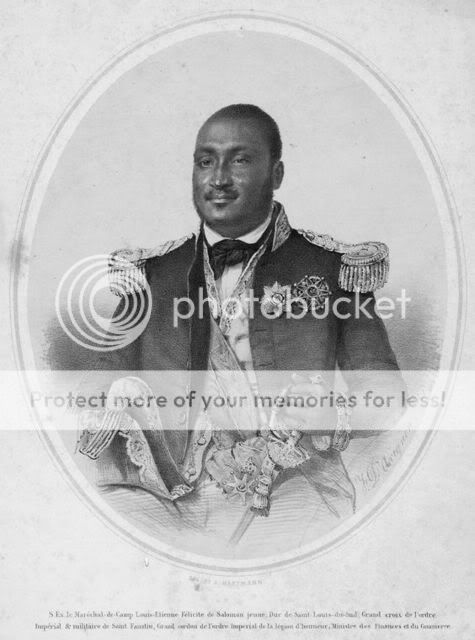 Prince Mainville-Joseph Soulouque (Soulouque Nephew) & Prince Alexandre Jean-Joseph (Soulouque Brother) 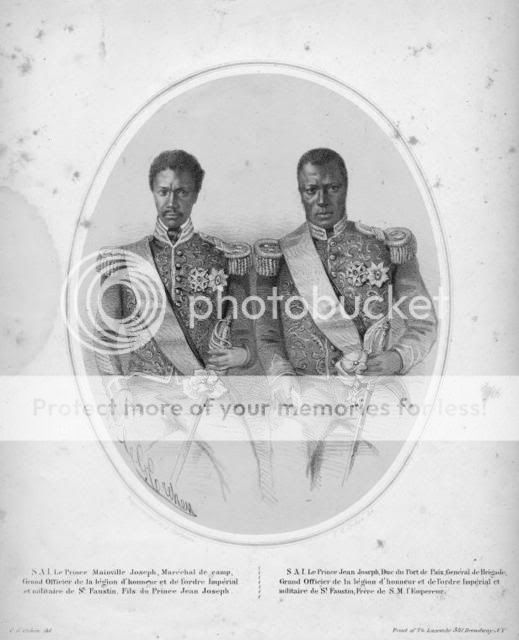 Louis Dufrene (Minister of War) 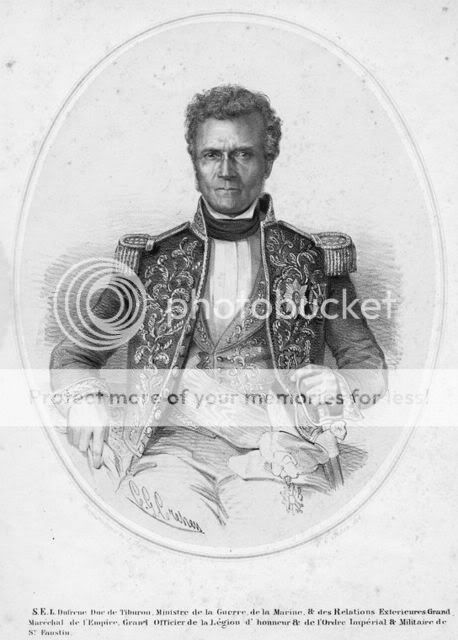 General Bissaou 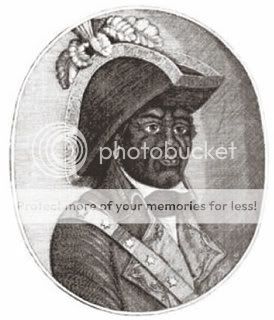 |
| Re: The Haitian History Thread by Eri8: 2:01am On Jun 06, 2013 |
Wow a country with so much history! Sad to see the country's condition at this time. |
| Re: The Haitian History Thread by Nobody: 3:44pm On Jun 06, 2013 |
Eri8: Wow a country with so much history! Sad to see the country's condition at this time. Thank you Eri8.  |
| Re: The Haitian History Thread by OdenigboAroli(m): 12:47am On Jun 07, 2013 |
I have always said it to everybody,Hatians are the pride of the black race. |
| Re: The Haitian History Thread by Nobody: 1:12am On Jun 07, 2013 |
Odenigbo Aroli: I have always said it to everybody,Hatians are the pride of the black race. Thank you.  Im on my phone so sadly I can't post anything. |
| Re: The Haitian History Thread by Eri8: 9:45pm On Jun 07, 2013 |
Their culture is so rich. Is crazy how a country of people that were enslaved and was shipped to the carribean can be stripped of their african culture and make a new one just as unique and interesting. 4 Likes |
| Re: The Haitian History Thread by Nobody: 8:09pm On Jun 08, 2013 |
Eri8: Their culture is so rich. Is crazy how a country of people that were enslaved and was shipped to the carribean can be stripped of their african culture and make a new one just as unique and interesting. Thanks. Haitian culture is mixed with mainly African and French, but also Spanish and even a little Arab. |
| Re: The Haitian History Thread by Eri8: 6:12am On Jun 09, 2013 |
Arab? How did that happen? Lol |
| Re: The Haitian History Thread by Nobody: 1:32pm On Jun 09, 2013 |
Kid... I am going to start a Haitian beauty thread in the sexuality section. I am gonna need ur help with it tho. wut ya say?  |
| Re: The Haitian History Thread by Nobody: 1:33pm On Jun 09, 2013 |
Eri8: Arab? How did that happen? Lol lol arabs have been in the Caribbean since Christopher columbus' era. hell even before the first Africans were brought there. I kid you not. they even brought camels there with them  They were Berbers/Sahelian and through time more Lebanese, Syrians; etc migrated. Matter of a fact Arabs have a huge presence in Colombia/south America. some of the people you think are typical Spanish speaking Hispanics are really arabs.  Shakira and Selma Hayek for example. |
| Re: The Haitian History Thread by Nobody: 1:53pm On Jun 09, 2013 |
| Re: The Haitian History Thread by Nobody: 6:28pm On Jun 09, 2013 |
Eri8: Arab? How did that happen? Lol Like Kails said there were always Arabs in Haiti. Check this out. https://www.youtube.com/watch?v=ngoXrY2BCd0 ^^^Its not in English, but it talks about Arab immigration to Haiti. Also Arabs brought Islam to Haiti... https://www.youtube.com/watch?v=GqfMPniRwbs |
| Re: The Haitian History Thread by Nobody: 6:29pm On Jun 09, 2013 |
@Kails Awesome thread. I'll try and help out.  |
| Re: The Haitian History Thread by MamiWata: 4:40pm On Jul 03, 2013 |
Haiti is also a member of the African Union and is the only diaspora nation to have that distinction. |
| Re: The Haitian History Thread by ckkris: 9:18pm On Jul 07, 2013 |
KidStranglehold:Please include how the United States turned around to join France and England to impose a 25-year debilitating economic sanction on Haiti, as compensation for losing the territory, which also crippled Haitian economy, as they all refused to trade with Haiti, refused to supply industrial equipment, and wouldn't buy Haitian products. |
| Re: The Haitian History Thread by Nobody: 9:31pm On Jul 07, 2013 |
Sa pase!! Nabule!! Viva Haiti!!!   |
| Re: The Haitian History Thread by ckkris: 7:10am On Jul 08, 2013 |
shymexx: Sa pase!!Interpretation, please! |
| Re: The Haitian History Thread by Nobody: 3:00pm On Jul 08, 2013 |
ckkris: Please include how the United States turned around to join France and England to impose a 25-year debilitating economic sanction on Haiti, as compensation for losing the territory, which also crippled Haitian economy, as they all refused to trade with Haiti, refused to supply industrial equipment, and wouldn't buy Haitian products. Yep! That's one of the reason why Haiti is in the state its in. |
| Re: The Haitian History Thread by MrsChima(f): 9:10am On Jul 09, 2013 |
Hey kid suga! Will add something soon. |
| Re: The Haitian History Thread by Nobody: 7:15pm On Jul 09, 2013 |
Mrs.Chima: Hmmmm let me find out..... KidStranglehold: exactly And like I said, Arabs have been in the new world even since before we were. The conquistadors were descendants of arabs,too. |
| Re: The Haitian History Thread by Nobody: 8:14pm On Jul 10, 2013 |
Mrs.Chima: Please do! |
Annang. / Why Do Foreigners Appreciate Nigerian Masquerades, Artifact More Than Nigerians? / Top 4 Richest Tribes In Nigeria
(Go Up)
| Sections: politics (1) business autos (1) jobs (1) career education (1) romance computers phones travel sports fashion health religion celebs tv-movies music-radio literature webmasters programming techmarket Links: (1) (2) (3) (4) (5) (6) (7) (8) (9) (10) Nairaland - Copyright © 2005 - 2024 Oluwaseun Osewa. All rights reserved. See How To Advertise. 115 |